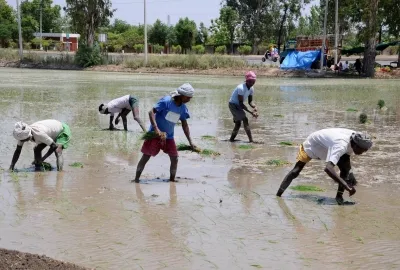How is Punjab Ensuring Continuous Power Supply for Paddy Plantation?

Synopsis
Key Takeaways
- Punjab government is committed to supporting farmers with reliable power supply.
- The DSR method promotes water conservation.
- Subsidies of Rs 1,500 per acre are available for adopting DSR.
- Electricity supply will be guaranteed for eight hours daily.
- Peak demand is planned to reach 17,000 MW this year.
Chandigarh, May 19 (NationPress) The Punjab government has finalized comprehensive measures to guarantee continuous power supply for farmers during the paddy planting season, as stated by state Power Minister Harbhajan Singh on Monday.
He mentioned that Chief Minister Bhagwant Mann has instructed the promotion of DSR (Direct Sowing of Rice), and the timeline for this has been announced earlier than in previous years.
The minister highlighted that traditional methods require approximately 3,800 litres of water to yield one kg of rice, whereas the DSR technique can conserve 400-500 litres of water per kg of rice.
Additionally, the government offers a subsidy of Rs 1,500 per acre to farmers who adopt the DSR approach.
The minister assured that uninterrupted electricity supply will be provided for eight hours daily during the paddy season, with the possibility of extending this duration if required.
Out of the 15 power plants in the state, 14 are currently operating at full capacity, and the remaining unit is expected to be operational within the next three days. He noted that last year, the peak electricity demand in Punjab reached 16,058 MW, and this year, provisions have been made for 17,000 MW. Moreover, power plants boast a 30-day coal reserve, and the state's transmission infrastructure has been enhanced.
The minister explained that paddy sowing, including DSR, will occur in a phased approach based on the established schedule. Direct sowing is permitted from May 15 to May 31. From June 1, sowing will be allowed in areas near the international border and those with canal irrigation facilities, including Faridkot, Bathinda, Ferozepur, Muktsar Sahib, and Fazilka. Starting from June 5, sowing can commence in Gurdaspur, Pathankot, Tarn Taran, Amritsar, Rupnagar, Mohali, Fatehgarh Sahib, and Hoshiarpur. Sowing in the remaining districts—Ludhiana, Malerkotla, Mansa, Moga, Patiala, Sangrur, Barnala, Kapurthala, Jalandhar, and Shaheed Bhagat Singh Nagar—will begin from June 9.









